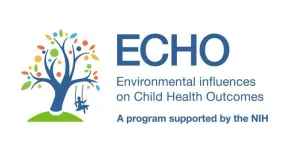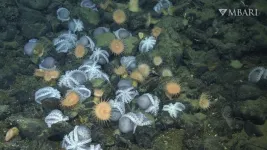(Press-News.org) A caregiver’s education level and their child’s age played large roles in determining their primary sources of stress during the COVID-19 pandemic, researchers found in a recent study by NIH’s Environmental influences on Child Health Outcomes (ECHO) Program. Caregivers who had less than a high school education were less likely to work remotely and were more worried about finances, childcare, and access to necessities like food. Caregivers with a master’s degree or higher reported greater concern about social distancing and impacts on their work.
The social factors that influenced infection rates, disease severity, and financial burden among adults during the pandemic have been broadly documented. However, ECHO researchers wanted to understand the experiences of children and their caregivers.
“Understanding these experiences can help uncover social differences that could worsen conditions for some populations during future public health crises,” said Kaja Z. LeWinn, ScD of the University of California, San Francisco.
Conducting population-based studies during the pandemic was challenging, but by using existing ECHO Program research sites across the United States and COVID-19 questionnaires, researchers were able to see how social and economic factors were affecting families and children throughout the height of the pandemic. The study analyzed data from 14,646 ECHO children and 13,644 ECHO caregivers between April 2020 and March 2022.
Caregivers completed ECHO’s COVID-19 surveys about their children’s and their own experiences during the pandemic. Researchers measured how the pandemic affected caregivers based on three demographic characteristics—caregiver education, their child’s age, and whether they lived in urban or rural settings. Researchers documented different pandemic-related outcomes for children and caregivers and compared these outcomes across demographic groups. For children, researchers documented COVID-19 infection, availability of COVID-19 testing, healthcare changes, and disruptions to school and daycare. For caregivers, researchers asked questions about remote work, childcare challenges, and their personal ranking of pandemic-related stressors.
Education affected caregiver experiences
Researchers found that caregivers with less than a high school education were more likely to report difficulties getting COVID-19 tests for their children. Caregivers also cited financial concerns and access to necessities such as food as primary sources of stress. In contrast, caregivers with a master’s degree or higher were more likely to name social distancing as the top source of their pandemic-related stress.
The study's findings also indicate that caregivers with higher education were significantly more likely to have the option to work remotely. Caregivers with a high school or less education were less likely to be able to work remotely or change work schedules to care for their children compared to those with a master’s degree or greater. Even though those with a bachelor’s degree were less likely than those with a master’s degree to work remotely, they were still more likely than those with lower education to change their work schedule to care for children.
Interestingly, the opposite relationship existed for arranging childcare. Those with a master’s degree or higher reported more challenges finding childcare than those with less than a high school education. There is evidence suggesting greater rates of childcare center closures in areas where people had higher levels of education. Informal childcare arrangements among families with lower education levels may have been less affected by center closures.
Caregivers of young children faced more challenges
Caregivers with children between the ages of 1 and 5 years reported the least support from school systems, the most difficulty finding childcare, and fewer remote learning options. They were also more likely to have healthcare appointments canceled due to COVID‑19 concerns and were most concerned about how the pandemic would affect their ability to work.
“Our findings suggest that families with young children may need more support related to childcare and work flexibility, especially when school disruptions are involved,” Dr. LeWinn said.
Researchers observed few differences in the experiences of urban and rural residents.
Future research may investigate the long-term effects these pandemic challenges may have on children in the ECHO Program over time.
Dr. LeWinn and Lisa Jacobson, ScD of Johns Hopkins University led this collaborative research published in JAMA Network Open.
About ECHO: Launched in 2016, the Environmental influences on Child Health Outcomes (ECHO) Program is a research program in the Office of the Director at the NIH with the mission to enhance the health of children for generations to come. ECHO investigators study the effects of a broad range of early environmental influences on child health and development. For more information, visit echochildren.org.
About the NIH: NIH, the nation’s medical research agency, includes 27 Institutes and Centers and is a component of the U.S. Department of Health and Human Services. NIH is the primary federal agency conducting and supporting basic, clinical, and translational medical research, and is investigating the causes, treatments, and cures for both common and rare diseases. For more information, visit www.nih.gov.
END
Education levels and child age shaped caregivers’ concerns amid Covid-19 pandemic, NIH study suggests
2023-08-23
ELSE PRESS RELEASES FROM THIS DATE:
There’s a growing split in the middle of the economic distribution for Americans nearing retirement age
2023-08-23
A study by health policy researchers at Columbia University Mailman School of Public Health and University of Southern California projects that the expected health and economic well-being of Americans nearing retirement age in the lower half of the economic distribution today is no better than that of their counterparts more than two decades ago. The focus of most policy efforts has been to support the most disadvantaged, generally considered the lowest 15 percent of the population with respect to financial resources. Less attention has been drawn to those between the 15th and ...
Lower-middle class Americans near retirement are worse off than 20 years ago, new USC and Columbia study shows
2023-08-23
Lower-middle class Americans nearing retirement age are worse off than their counterparts more than two decades ago, while upper-middle Americans have largely seen their life expectancy and wealth improve. Policymakers, meanwhile, overlook the lower middle group of Americans who don’t qualify for many assistance programs. That’s according to a new study by the USC Schaeffer Center for Health Policy & Economics and the Columbia University Mailman School of Public Health.
Using data from the Health and Retirement Survey and a microsimulation called the Future Elderly Model, researchers estimated future life expectancy and disability for cohorts of individuals ...
Small study suggests long COVID may affect more people than previously thought
2023-08-23
EMBARGOED FOR RELEASE UNTIL 4 P.M. ET, WEDNESDAY, AUGUST 23, 2023
MINNEAPOLIS – Millions of Americans were exposed to SARS-CoV-2, the virus that causes COVID-19, early in the pandemic but could not get diagnosed due to testing limitations. Many of those people developed a post-viral syndrome with symptoms similar to those of long COVID. In a new study of a small group of those people, their immune response shows that 41% had evidence of SARS-CoV-2 exposure. The study is published in the August 23, 2023, online issue of Neurology® Neuroimmunology & Neuroinflammation, an official journal of the American Academy of Neurology. Long COVID was defined as symptoms persisting ...
A new targeted treatment shows promise for select patients with stomach cancer
2023-08-23
An international phase 3 clinical trial, done in participation with Weill Cornell Medicine and NewYork-Presbyterian, found that a new targeted treatment called zolbetuximab, given in combination with a standard chemotherapy, extended survival for patients with advanced gastric or gastroesophageal junction cancer that overexpressed a specific biomarker.
Results from the GLOW study, published July 31 in Nature Medicine, together with results from the parallel SPOTLIGHT study that evaluated zolbetuximab with an alternative standard chemotherapy, prompted the ...
Shift work may impair memory and cognition, per data on nearly 50,000 Canadian adults
2023-08-23
Exposure to night shift work and rotating shift work is associated with an increased risk of cognitive impairment among middle-aged and older adults, according to a new study published this week in the open-access journal PLOS ONE by Durdana Khan of York University, Canada, and colleagues.
Previous research has established that shift work, which refers to any work schedule that occurs outside the traditional 9am to 5pm working hours, has significant health impacts. In the new work, the researchers analyzed data on 47,811 adults in the Canadian Longitudinal Study. The dataset included ...
Opportunistic sperm and northern bottlenose whales frequently observed swimming behind deep-sea trawler net to feed on escaping fish
2023-08-23
Sperm and northern bottlenose whales were frequently observed following a trawler off the coast of Newfoundland to feed on fish escaping from the net as it was hauled in, according to a study published August 23, 2023 in the open-access journal PLOS ONE by Usua Oyarbide from Plentzia Marine Station–Univ Basque Country, Spain, and colleagues.
In this study, the authors looked at how cetaceans interacted with a deep-sea trawler fishing in the western North Atlantic off the coast of Newfoundland in 2007. Oyarbide tracked whale encounters over 50 days between July 20 and September 13, 2007, while onboard the trawler as a North Atlantic Fisheries Organization observer.
Sperm whales (Physeter ...
Scientists solve mystery of why thousands of octopus migrate to deep-sea thermal springs
2023-08-23
In 2018, researchers from NOAA’s Monterey Bay National Marine Sanctuary and Nautilus Live observed thousands of octopus nesting on the deep seafloor off the Central California coast. The discovery of the “Octopus Garden” captured the curiosity of millions of people around the world, including MBARI scientists. For three years, MBARI and collaborators used high-tech tools to monitor the Octopus Garden and learn exactly why this site is so attractive for deep-sea octopus.
In a new study published today in Science Advances, a team of researchers from MBARI, NOAA's Monterey Bay National Marine Sanctuary, Moss Landing Marine Laboratories, the University ...
Malaysian rock art found to depict elite–Indigenous conflict
2023-08-23
A team of researchers led by the Griffith Centre for Social and Cultural Research in collaboration with The Sarawak Museum Department have become the first to date drawings of Gua Sireh Cave in Sarawak, uncovering a sad story of conflict in the process.
The limestone cave of Gua Sireh in western Sarawak (Malaysian Borneo) is famous for the hundreds of charcoal drawings lining the walls of its main chambers, attracting hundreds of visitors each year.
Approximately 55km southeast of Sarawak’s Capital, Kuching, the site is managed by the Bidayuh (local Indigenous peoples) in collaboration with The Sarawak Museum Department, ...
How a cup of water can unlock the secrets of our Universe
2023-08-23
Researchers from Queen Mary University of London have made a discovery that could change our understanding of the universe. In their study published in Science Advances, they reveal, for the first time, that there is a range in which fundamental constants can vary, allowing for the viscosity needed for life processes to occur within and between living cells. This is an important piece of the puzzle in determining where these constants come from and how they impact life as we know it.
In 2020, the same team found that the viscosity of liquids is determined by fundamental physical constants, setting a limit on how runny a ...
How neurons grow comfortable in their own skin
2023-08-23
Nerve cells that sense touch grow the appropriate endings for hairy or hairless skin based on cues from the skin itself, rather than through predetermined programming, according to research led by Harvard Medical School scientists and published Aug. 21 in Developmental Cell.
If affirmed in further studies, the findings could eventually help researchers develop therapies to regenerate damaged or diseased nerves, the authors say, or better understand what goes awry in congenital neuropathies, conditions in individuals born with ...








